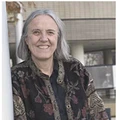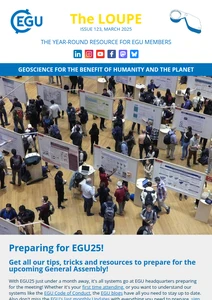President: Davide Faranda
(Emailnp@egu.eu)
Deputy President: François Schmitt
(Email)
ECS Representative: Mireia Ginesta-Fernandez
(Emailecs-np@egu.eu)
The Nonlinear Processes in Geosciences (NP) Division is an interdisciplinary division which is concerned with all aspects on nonlinear and stochastic theories, methods and data in the geosciences. The NP division is focused on a series of nonlinear paradigms whose applications cut across the different disciplines of the geosciences (hydrosphere, atmosphere, biosphere, lithosphere, space sphere…). Examples include chaos, tipping points, nonlinear waves, similarity across scales (scaling, scale invariance, fractals, multifractals), network theory, nonlinear stochastics, predictability and its limits, pattern formation, self-organised criticality, extreme events, deep learning… The NP division welcomes mathematical and theoretical approaches, as well as applications including new methodologies, new modelling and new data analysis techniques.
Due to its interdisciplinary character, many of the NP-sessions during the EGU general assemblies are co-organized with sessions from other divisions. Potential contributors to any session are encouraged to evaluate the benefits of a multi-disciplinary organization in collaboration with the corresponding disciplinary Division.
The division is structured into several subdivisions (see the “About” tab above, for the NP Division structure information and reports).
The Division contributes to the EGU Awards & Medals programme. As for all EGU Divisions, an Early Career Scientist Award is established also for the NP Division and is given to young researchers who obtained outstanding results in the nonlinear geosciences. Every year the Lewis Fry Richardson medal is awarded to scientists for their exceptional contributions to nonlinear geosciences in general. Members of the Division are invited to contribute to the nominations (deadline are every year on the 15th June, see here) for both the NP Division Awards and Medals.
The division maintains very strong links with the EGU publication committee, and especially with the board of Editors of the open access journal Nonlinear Processes in Geophysics (NPG), an interdisciplinary journal for the publication of original research furthering knowledge on nonlinear processes in all branches of Earth, planetary, and solar system sciences.
Latest posts from the NP blog

NP Interview the incoming Nonlinear Processes in Geosciences Division President: Davide Faranda
Today’s NP Interviews hosts the incoming NP Division President Davide Faranda. Davide is Research Director in Climate Physics in the Laboratoire de Science du Climat et de l’Environnement (LSCE) of the Institute Pierre Simon Laplace at the French National Center for Scientific Research (CNRS). He is an expert of weather extreme events such as cold spells, heatwaves, cyclones and severe thunderstorms. His research activity focuses on the attribution of extreme events to climate change, that is understanding how much greenhouse …
Read more
NP Interview the outcoming Nonlinear Processes in Geosciences Division President: François Schmitt
Today’s NP Interviews hosts the outcoming NP Division President François Schmitt. François has a PhD degree from Université Pierre et Marie Curie in Paris (1993), in atmospheric turbulence, and an Habilitation degree from the same university (2001). He has stayed in Belgium during 6 years as a post-doc, working in meteorology and in fluid mechanics. He is CNRS researcher in Wimereux (North of France) since 2002. There he has been director of the Laboratory of Oceanology and Geosciences during 14 …
Read more
Recent awardees

- 2025
- Lewis Fry Richardson Medal
The 2025 Lewis Fry Richardson Medal is awarded to
Vincenzo Carbone for outstanding contributions to the study of turbulence in magnetohydrodynamics, particularly in the solar wind and space plasmas, as well as its impact on the Earth’s magnetosphere and climate.
Read more

- 2025
- Division Outstanding Early Career Scientist Award
The 2025 Division Outstanding Early Career Scientist Award is awarded to
Johannes Jakob Lohmann for important contributions to our understanding of non-linear climate dynamics during the last glacial period.
Read more

- 2024
- Lewis Fry Richardson Medal
The 2024 Lewis Fry Richardson Medal is awarded to
Annick Pouquet for her outstanding contributions to the field of theoretical and computational turbulence in neutral and conducting fluids, in particular in magnetohydrodynamic (MHD) turbulence and dynamo theory.
Read more

- 2024
- Division Outstanding Early Career Scientist Award
The 2024 Division Outstanding Early Career Scientist Award is awarded to
Simone Benella for his many original contributions in the field of stochastic processes, advancing the understanding space plasma dynamics.
Read more

- 2024
- Outstanding Student and PhD candidate Presentation (OSPP) Award
The 2024 Outstanding Student and PhD candidate Presentation (OSPP) Award is awarded to
Abdallah Aoude Design of a new laboratory earthquake experiment
Read more
Current issue of the EGU newsletter
In our March issue we are here to help you prepare for the EGU25 General Assembly, with guides for first time attendees, understanding the EGU Code of Conduct, our playlist of EGU25 walk-through videos, two webinars to help you prepare your presentations and sign ups open for the EGUtoday newsletter, we are excited to get together with you all, in Vienna and online, in less than a month!
This month we also learned about a special scientific landscape under threat and what we can do to help, and now is also your last chance to get involved in the Science for Policy interface in Europe by applying to join EGU's new Climate Hazard and Risk Task Force by 31 March.
For all our talented photographers, the EGU Photo Competition is still open for submissions; enter by 31 March and you could win free registration to EGU26, and the admiration of your peers! All this and much more in this month's Loupe!
Read more







